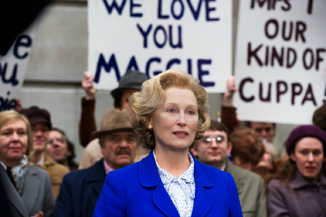Movie Review: The Iron Lady
By Matthew Huntley
January 23, 2012
BoxOfficeProphets.com

Like many speculative biopics, including Clint Eastwood’s recent J. Edgar, this one begins in or around the present day and works its way back through the title character’s life via flashbacks. We first see a slow and feeble-minded Thatcher (Meryl Streep, looking eerily like the real “MT”) buying a pint of milk at a local convenient store. She comes home and tells her husband Denis (Jim Broadbent) the price went up again, which is one of the ways she proves she’s still in touch with the people. In touch with the people she may be, but the same cannot be said of reality. Showing the early signs of dementia, Thatcher often confuses the present with the past and she doesn’t always remember that Denis died years ago. In fact, her family has been on her case to pack up his things so she can move on.
The film uses Thatcher’s fragile mental condition as a springboard to jump to different parts of her life and political career. The younger of two children, she was born into a Methodist family in Grantham, where her father was a grocer and mayor. She paid close attention to his speeches, which would eventually shape her own conservative ideals. A hard worker who was constantly determined to improve herself, Thatcher attended Oxford University and, at 25, became the youngest and only female candidate to run for a safe Labour seat in 1950 and 1951. Though she failed to win both times, she did meet her future husband in the process, but before agreeing to be his wife, she vowed she would never become some idle woman who didn’t speak her mind and whose only legacy would be a clean set of dishes. Bottom line: she wasn’t going to let her sex limit her voice or her ambition.
That notion became clearer when she decided to run for Conservative Party Leader in 1975 and eventually Prime Minister four years later. She was aided by Gordon Reece (Roger Allam), a journalist and television producer, who counseled her as a political strategist, and we get the usual montage where Thatcher is groomed and conditioned, via speech lessons and a variety of new hairdos, to “put the ‘great’ back in Great Britain.” In the wake of widespread trade union strikes and the Labour Party’s ill-conceived attempt to control inflation, Thatcher promised a new beginning and won the vote. Her term would last for 11 years and become the longest of any 20th century prime minister in the UK.
This information is all well and good and makes for an intriguing historical study, but as a film, The Iron Lady lacks spark. It’s content with being a traditionally structured biopic that simply skims over the major bullet points of Thatcher’s career, including her conflicts and near-death experience with the IRA; her popular handling of the Falklands War; her preference of privatization over government-controlled industries; and the general uphill battles she faced because she was a woman in supposed man-only territory. The film is informative and educational, yes, and the performance by Streep is as good as any the actress has ever done (when has Streep not been good?), but the way it’s presented doesn’t make for a very exciting or dramatic experience. Instead of captivating us with theories or imagination, it’s more a history book manifest, which has some value, but it’s not especially entertaining, and I found myself struggling to invest in the narrative or get caught up her situations.
After a while, I recognized a familiar biopic pattern that screenwriter Abi Morgan and director Phyllida Lloyd were adhering to, which was to have the present-day Thatcher see or hear something that would trigger a past memory and then the film would re-enact the ensuing historical headline. The question left on my mind was, what was this film doing that a history lesson couldn’t?
Given Thatcher’s political ideals, which could arguably be construed as harsh and cold, I guess I’m not surprised a film told from her point of view would struggle to be affecting, that it would be hard for us to find a conduit into the story. I think it would have been better off seeing things from the perspective of her grown daughter, Carol (Olivia Colman), who knows her mother’s mind is slipping. Carol is one of the few characters we identify with and among many who feels the pressures of Thatcher’s strict policies, not just in politics, but in life. This isn’t meant to make Thatcher out to be a wretched old woman who lacks sensitivity, but her sternness and obstinacy were sort of her trademark and they were higher than most people’s, which is why we needed someone from the outside, someone more relatable, to give us a glimpse into her world. That would have made us care more.
After seeing The Iron Lady, I recognized that I learned some things about an uncommonly remarkable woman and appreciated a performance from Meryl Streep that will probably earn the actress her 17th Oscar nomination, but the experience as a whole felt empty and inconsequential. The film would come in handy if I was writing a report on Margaret Thatcher, but its entertainment value is limited. I think a successful biopic can be made about anybody, and in the case of MT, it happens it would be most strong and interesting to tell it from point of view of someone looking in, not from the main subject looking out.